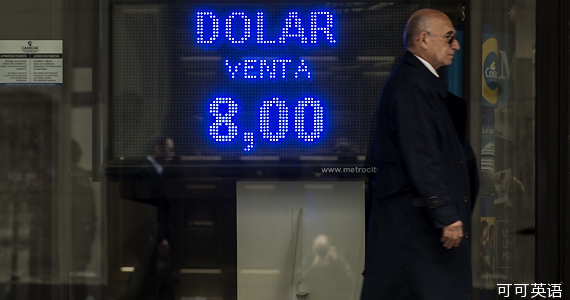
When the money keeps rolling out you don’t keep books,
当大把的钱不断流出,你可不会把账本留着,
You can tell you’ve done well by the happy grateful looks.
人们快乐而感激的表情,让你知道你做得不错。
Evita, lyrics by Tim Rice
《艾薇塔》(Evita),蒂姆•赖斯(Tim Rice)作词
Argentina has been here before. So have many other emerging markets. For the second time in six months, money is rolling out. Emerging currencies are under acute pressure, as are bonds and equities.
阿根廷如今上演的一幕似曾相识。许多其他新兴市场也是如此。6个月来,资金第二次涌出阿根廷。像债市及股市一样,新兴市场货币也正面临严峻压力。
But the important point about crises in emerging markets is that they do not start there. Instead, they are almost invariably triggered by the actions of investors or central banks in the developed world.
然而,对于新兴市场危机来说,重要之处在于危机并非始自新兴市场自身。相反,危机几乎无一例外地由发达国家投资者或央行引发。
Emerging markets have made strides during the past two decades. With a few exceptions, they have let their exchange rates float, built the institutions needed for free-market capitalism, and developed local debt markets to cut reliance on foreign funds.
过去20年里,新兴市场取得了长足进步。除了少数例外,新兴市场国家放开了汇率,设立了自由市场资本主义所需的制度,并建立了完善的地方债市场,以减少对外资的依赖。
But certain truths remain. Flows of foreign capital still dwarf local money. While that money keeps rolling in, the temptation is to behave like a latter-day Eva Peron; and when that money rolls out, there can be problems.
然而,某些事实依然没有改变。外资的流入仍令本国资金相形见绌。当资金持续流入时,人们很容易像伊娃•贝隆(Eva Peron)那样予以抵制。然而当资金流出时,就可能出现问题。
Look at a historical precursor: the wave of emerging markets crises in the late 1990s that started with Mexico’s “tequila crisis”. It started in 1994 when the government gave up defending its peso at an overvalued level.
这个问题有个前车之鉴——上世纪90年代末那轮始于墨西哥“龙舌兰酒危机(tequila crisis)”的新兴市场危机。这一危机始于1994年,当时墨西哥政府不再将维持比索汇率的过高估值。
Mexico had been spending beyond its means. But the trigger for crisis came from the US, where the Federal Reserve that year raised rates sharply to head off inflation. That brought money home and revealed Mexican problems.
在那以前,墨西哥确实一直入不敷出。然而危机却发端于美国。1994年,美联储(Fed)为消除通胀大幅加息。这导致资金回流美国,从而暴露了墨西哥的问题。
Last week’s events fit the 1990s template, only now China has emerged as the world’s second economic superpower. Events there, as well as in the US, can send money scurrying for cover.
上周发生的事情也是上世纪90年代危机的翻版,只是这次中国已成了世界第二经济大国。发生在中美两国的事情,共同导致资本迅速转移,寻求庇护。
Argentina is a special case. Its debt was downgraded late last year, to reflect concern at the new economic team of the president, Cristina Fernández, so many institutions are barred from investing in it. It is no longer even considered an “emerging” market by MSCI, the guardians of the term for equity markets, so many equity investors cannot buy Argentina.
阿根廷是个特例。去年,出于对阿根廷总统克里斯蒂娜•费尔南德斯(Cristina Fernández)新经济团队的担心,阿根廷国债被调降评级,这导致许多机构都被禁止投资阿根廷国债。“新兴市场”指数编纂者——摩根士丹利资本国际(MSCI)甚至不再把阿根廷视为“新兴”市场,这令许多股权投资者无法买入阿根廷股票。
There is little reason why Argentina should affect others, beyond its neighbours.
也就是说,几乎没什么理由能证明阿根廷会影响除邻国外的其他国家。
Rather, the exit from emerging markets has been driven by renewed concern about the Fed. Talk that it would taper off its bond purchases, which kept US rates low and encouraged money to go overseas, last summer led to a sell-off in emerging markets.
相反,此次资金逃出新兴市场的行为是新一轮对美联储的担忧推动的。美联储对债券的收购将美国利率保持在低点,并鼓励资金流向海外。而去年夏天,有关美联储会逐步缩减这一收购力度的说法,曾导致新兴市场出现一轮抛售行为。
When the Fed finally tapered, in December, it muted the effects with forward guidance that in effect promised that rates could not start to rise until 2015 at the very earliest. Last week’s sell-off of emerging currencies came as traders worried that such “forward guidance” could not be trusted.
当美联储12月份终于开始逐步退出量宽时,该机构用“前瞻性指引”(forward guidance)压制了以上后果。从效果上来说,这个“前瞻性指引”等于是承诺至少到2015年前都不会加息。然而,上周新兴市场货币还是遭到了抛售,这是由于交易者担心不能相信这种“前瞻性指引”。
The fate of the forward guidance offered in August last year by Mark Carney, governor of the Bank of England, demonstrates the problem. He promised not to raise rates at least until unemployment dropped to 7 per cent; it has since fallen faster than expected, to 7.1 per cent; and so Mr Carney last week downplayed the importance of his guidance.
英国央行(BoE)行长马克•卡尼(Mark Carney)去年8月曾提出的“前瞻性指引”就反映了这个问题。当时他承诺在失业率降至7%以下之前不会提升利率。但自那以后,失业率的下降却比预期要快,降至7.1%。于是,卡尼上周淡化了其前瞻性指引的重要性。
The message for traders: central banks can always retreat from guidance if they have to.
这向投资者传递了一个信息:只要有必要,央行总是会收回前瞻性指引。
Then there is China. HSBC’s flash estimate of the ISM supply managers’ index last week suggested the economy was shrinking. Further, money market rates in China are spiking upwards, in a crude attempt by the authorities to bring credit under some control. And China faces a test case over whether it will allow defaults by trust loans, a form of shadow banking.
还有一个问题是中国。汇丰银行(HSBC)上周对供应管理协会(Institute for Supply Management, ISM)采购经理人指数(PMI)的初步预测暗示,中国经济正在收缩。更严重的问题是,由于中国当局试图粗暴地控制信贷,中国货币市场利率开始飙升。此外,中国还面临一个考验:是否会允许信托贷款(影子银行的一种形式)出现违约。
Faced with such concerns, US and western money headed home and into Treasury bonds, which are now yielding almost exactly what they were when the Fed announced its taper in December.
在这类担忧情绪的影响下,美国和西方资金出现回流,流向美国国债。如今,美国国债收益率几乎与12月份美联储宣布缩减量化宽松时的水平完全相同。
Sentiment towards emerging markets tends to move in long waves. As the chart shows, developed markets have beaten emerging markets during the past 20 years, a period that starts on the eve of the tequila crisis – even though emerging markets have grown far faster.
对新兴市场的偏好变化的周期往往很长。正如图表所示,过去20年里(这20年的开头正处于龙舌兰酒危机发生前夜),MSCI发达市场指数的表现始终强于新兴市场——尽管新兴市场的增长要快得多。
Such waves of sentiment are hard to stop. This one could easily last longer.
这种市场情绪的波动很难停下来。而这一次市场情绪的波动很可能会持续更长时间。
Emerging markets funds have suffered persistent outflows for more than three months, according to EPFR data, without what BofA Merrill Lynch calls true “capitulation”. That would mean outflows of more than $20bn per week; the latest week saw an outflow of $2.4bn.
据新兴投资组合基金研究公司(EPFR)的数据,新兴市场资金遭遇的外流潮已持续了逾3个月,却没有出现美银美林(BofA Merrill Lynch)所称的“投降式抛售(capitulation)”。这意味着每周外流资金的规模超过了200亿美元。最近一周,外流资金的规模为24亿美元。
As for currencies, fair value measures kept by Deutsche Bank’s Alan Ruskin suggest that none has yet overshot, and that Brazil’s real is close to its 10-year average, after accounting for inflation.
至于汇率,德意志银行(Deutsche Bank)艾伦•拉斯金(Alan Ruskin)所做的公允价值评估表明,目前所有新兴市场货币的汇率都不算离谱。比如,巴西雷亚尔的汇率在扣除通胀因素后就接近其十年平均值。
In the long run, the well-rehearsed arguments for emerging markets remain good. They are likely to grow faster than the west, and do not look expensive. Those with a long-term horizon might well start dribbling money into emerging markets.
长期来说,人们耳熟能详的有关新兴市场的说法依然没错。新兴市场的增长速度很可能比西方快,资产价格似乎也不高。有长远眼光的人最好是开始将资金逐渐转入新兴市场。
But the risks remain high that emerging markets assets will soon be cheaper still. That will depend largely on the Fed, and on China.
不过,新兴市场资产不久后进一步贬值的风险依然很高。这在很大程度上要看美联储和中国采取如何动作。


